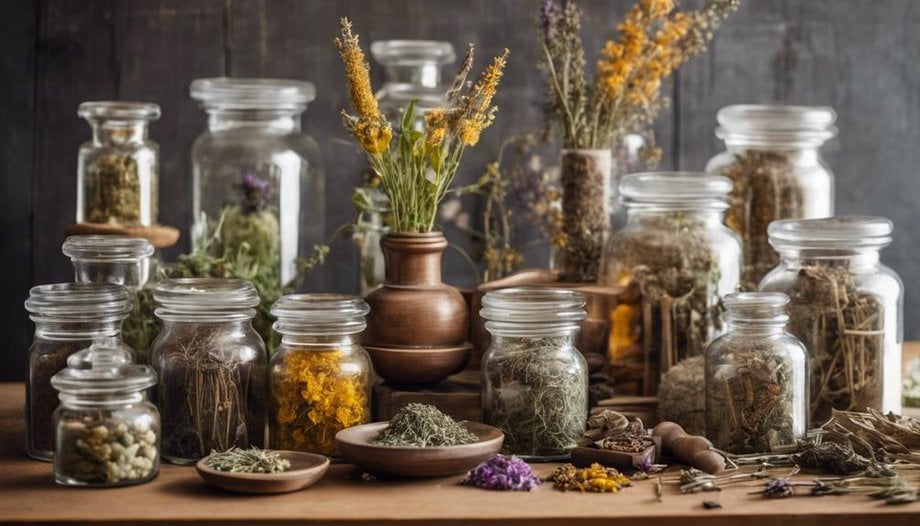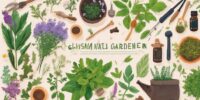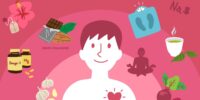The Herbal Apothecary: 100 Medicinal Herbs by JJ Pursell – Summary and Review

This book provides detailed information on how to grow, harvest, and use each herb for specific health benefits. It includes recipes for making teas, tinctures, salves, and other herbal preparations to treat a variety of common ailments. Readers will also learn about the history and folklore surrounding each herb, adding depth to their understanding of traditional herbal medicine.
Overall, The Herbal Apothecary is a valuable resource for anyone interested in exploring the world of natural remedies and traditional healing practices.
Key Takeaways
- Explore 100 medicinal herbs with diverse health benefits for holistic well-being.
- Learn about traditional uses and healing properties of herbs like chamomile and lavender.
- Embrace personalized herbal wellness practices for a transformative well-being experience.
- Cultivate a harmonious balance of mind, body, and spirit through herbal remedies and natural healing modalities.
Author Background and Expertise
The author of 'The Herbal Apothecary' exudes a profound understanding of herbal remedies honed through decades of dedicated practice and research. With a background steeped in herbal education and a passion for plant medicine, the author brings a wealth of knowledge to readers seeking natural remedies. Through years of hands-on experience and a deep connection to the healing power of plants, the author imparts wisdom that resonates with those who value holistic health practices.
Having immersed themselves in the world of herbal medicine, the author not only educates but also inspires individuals to explore the vast benefits of plant-based healing. Their expertise shines through in the meticulous research and practical application of herbal remedies, making 'The Herbal Apothecary' a valuable resource for novices and seasoned herbalists alike. By sharing their insights and experiences, the author empowers readers to embrace the freedom of choice when it comes to nurturing their well-being through natural means.
Overview of the 100 Medicinal Herbs
Within the pages of 'The Herbal Apothecary,' readers are introduced to a rich tapestry of 100 medicinal herbs, each offering a distinct blend of properties and health benefits. This thorough overview serves as a treasure trove of herbal knowledge, highlighting the diverse array of healing potentials found in nature's pharmacy.
From soothing chamomile to invigorating ginseng, these herbs beckon exploration and hold the promise of holistic well-being.
Herb Properties Overview
Exploring the extensive array of medicinal herbs reveals a world of diverse and potent healing properties. Each herb possesses unique characteristics that make them valuable for various ailments. Here is a brief overview of some of the herbs and their properties in the 100 Medicinal Herbs book by JJ Pursell:
| Herb | Identification | Herbal Preparations |
|---|---|---|
| Lavender | Purple flowers | Infusions, oils |
| Echinacea | Purple coneflower | Tinctures, teas |
| Peppermint | Minty scent | Essential oils, teas |
These herbs showcase a small glimpse of the vast world of herbal medicine, offering a glimpse into the power of nature's remedies.
Health Benefits Summary
Revealing the potential of herbal medicine exposes a treasure trove of health benefits waiting to be discovered. The 100 medicinal herbs featured in 'The Herbal Apothecary' by JJ Pursell offer a myriad of wellness benefits through their healing properties and traditional uses.
Here is a glimpse of what these herbal remedies can offer:
- Enhanced Immunity: Many herbs in the apothecary are known for their immune-boosting properties, helping the body ward off illnesses.
- Digestive Support: Some herbs aid in digestion, soothing stomach discomfort and promoting gut health.
- Stress Relief: Certain herbs possess calming effects, assisting in relaxation and stress reduction.
Explore the diverse world of herbal medicine to harness its natural healing powers for your well-being.
Traditional Uses and Healing Properties
Harnessing the ancient wisdom of nature, the herbal apothecary reveals a treasure trove of traditional uses and healing properties that have stood the test of time. Throughout history, traditional practices have relied on herbal remedies to treat a myriad of ailments and promote overall well-being. From soothing chamomile for relaxation to invigorating ginseng for energy, these herbs offer a natural alternative to conventional medicine. Below is a table showcasing a selection of medicinal herbs, their traditional uses, and healing properties:
| Herb | Traditional Uses | Healing Properties |
|---|---|---|
| Chamomile | Calming nerves | Anti-inflammatory, aids digestion |
| Echinacea | Boosting immune system | Antiviral, stimulates immune response |
| Lavender | Promoting relaxation | Antioxidant, antimicrobial |
| Peppermint | Easing digestion | Analgesic, relieves nausea |
| Turmeric | Anti-inflammatory | Antioxidant, supports liver health |
These herbs not only offer therapeutic benefits but also connect us to the wisdom of our ancestors who relied on the healing power of nature.
Practical Tips for Herbal Integration
Incorporating medicinal herbs into daily routines can enhance overall well-being and support natural healing processes. Herbal preparations offer a gentle and holistic approach to health, promoting harmony between the body, mind, and spirit.
Here are practical tips for herbal integration:
- Start Slow: Begin by incorporating one herb at a time to observe its effects on your body and gradually build your herbal repertoire.
- Create Rituals: Infuse herbal preparations into daily rituals like morning tea or bedtime routines to make herbal integration a seamless part of your day.
- Educate Yourself: Take the time to learn about different herbs, their properties, and how to prepare them. Knowledge empowers you to make informed choices in integrative medicine.
Safety Precautions and Contraindications
As one explores further into the world of herbal integration, it becomes imperative to understand the safety precautions and potential contraindications associated with different medicinal herbs. Herbal interactions can have profound effects on the body, and it's important to be aware of how various herbs may interact with each other or with medications one may be taking. Consulting with a qualified herbalist or healthcare provider can provide invaluable insights into these interactions.
Additionally, dosage guidelines play a vital role in ensuring the safe and effective use of medicinal herbs. Different herbs have varying levels of potency, and understanding the appropriate dosage for each herb is essential to prevent any adverse effects. Overconsumption of certain herbs can lead to unwanted side effects, underscoring the importance of following recommended dosage instructions meticulously.
Holistic Wellness Applications
Within the domain of holistic wellness applications, one can uncover a treasure trove of healing benefits that extend beyond mere physical ailments.
The diversity of herbal remedies offers a vast array of options to address individual needs and preferences.
Embracing health restoration practices rooted in holistic approaches can foster a profound sense of well-being and vitality.
Holistic Healing Benefits
Embracing a comprehensive approach to wellness brings forth a harmonious integration of mind, body, and spirit for maximum healing benefits. This interconnected perspective acknowledges the intricate relationship between various aspects of one's being, encouraging overall well-being through natural practices.
When exploring the comprehensive healing benefits of herbal remedies and plant medicine, individuals may experience:
- Enhanced essential and energy levels
- Improved mental clarity and focus
- Strengthened immune system function
Herbal Remedies Diversity
The profound array of herbal remedies showcases a rich tapestry of holistic wellness applications, offering a diverse spectrum of natural healing potentials for individuals seeking to nurture their well-being.
Herbal recipes, designed with a blend of ancient wisdom and modern understanding, provide a gateway to personalized healing experiences. Whether concocting soothing teas, healing salves, or invigorating tonics, the versatility of herbal remedies allows for tailored approaches to wellness.
Additionally, cultivating herbal gardens can deepen the connection to nature and foster self-sufficiency in health practices. Embracing the diversity of herbal remedies not only empowers individuals to take charge of their well-being but also encourages a harmonious relationship with the natural world, promoting a sense of freedom in holistic living.
Health Restoration Practices
In the domain of holistic wellness applications, the art of health restoration practices materializes as a profound journey towards rejuvenation and balance. Embracing a holistic approach to healing allows individuals to tap into the innate wisdom of their bodies and minds, fostering a deep connection with the natural world around them. Through natural healing modalities, one can experience a transformative shift towards best well-being and vitality.
- Mind-Body Connection: Cultivating harmony between the mind and body through practices like yoga and meditation.
- Nutritional Healing: Nourishing the body with whole foods and herbal remedies to support its natural healing processes.
- Energy Balancing: Aligning the body's energy centers through practices such as acupuncture or Reiki to promote holistic wellness.
Final Thoughts and Recommendations
As the journey through the herbal apothecary comes to a close, it becomes evident that incorporating herbal remedies into daily wellness routines can be a transformative and enriching experience.
The wisdom of generations past, encapsulated in the healing properties of plants, offers a profound connection to nature and a gentle path towards holistic well-being. JJ Pursell's book, 'The Herbal Apothecary: 100 Medicinal Herbs,' serves as a beacon of knowledge, guiding readers through the vast world of herbal medicine with clarity and insight.
In these final thoughts, it's recommended to approach herbal remedies with an open mind and a willingness to explore alternative healing modalities.
The gentle yet potent nature of herbs can complement traditional medicine and offer a more personalized approach to health restoration. By incorporating herbs into daily rituals, individuals can cultivate a deeper awareness of their bodies and the natural world around them.
Embracing the power of plants can lead to a harmonious balance of mind, body, and spirit, ultimately fostering a sense of freedom in one's wellness journey.
Frequently Asked Questions
Can the Medicinal Herbs Mentioned in the Book Be Grown at Home, and if So, What Are Some Tips for Cultivating Them Effectively?
One can cultivate medicinal herbs at home for benefits like easy access to fresh remedies. Success in home cultivation requires proper growing techniques like providing adequate sunlight, water, and soil conditions tailored to each herb's specific needs.
Are There Any Specific Herbal Combinations or Recipes Recommended in the Book for Common Health Concerns or Ailments?
Herbal combinations in the book offer solutions for various health concerns. From soothing teas to potent tinctures, the recipes cater to common ailments. These blends can empower individuals to take charge of their well-being naturally.
How Does the Author Recommend Incorporating Herbal Remedies Into Daily Routines or Existing Healthcare Regimens?
Incorporating herbs into daily routines can enhance one's herbal healthcare regimen. The author suggests integrating herbs through teas, tinctures, or infused oils. By incorporating these remedies into existing routines, individuals can experience the benefits of herbal medicine seamlessly.
Are There Any Potential Interactions Between the Medicinal Herbs in the Book and Common Medications or Supplements That Readers Should Be Aware Of?
Incorporating medicinal herbs into daily routines can offer benefits but being mindful of potential interactions with common medications or supplements is essential. Understanding herbal combinations, herbal cultivation, and consulting healthcare providers adds wisdom to wellness journeys.
Are There Any Resources or Additional Reading Materials Recommended by the Author for Further Exploration of Herbal Medicine and Natural Healing Practices?
For those seeking to explore deeper into herbal medicine and holistic healing, JJ Pursell recommends investigating herbal workshops and online courses. These resources can provide valuable knowledge and insights into natural healing practices.











